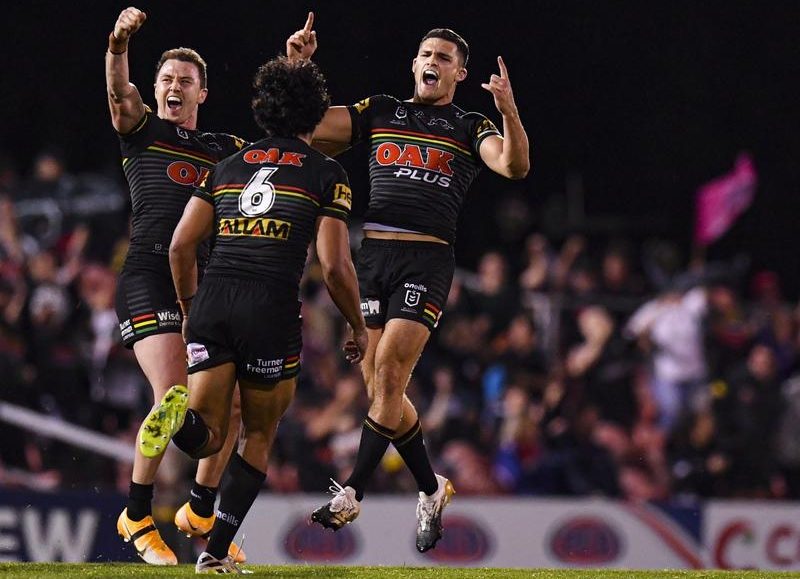
Penrith had one simple mantra during the NRL’s six-week COVID shutdown.
Whoever found a way to deal with an unprecedented situation would go a long way towards winning the premiership.
“That was our motto straight away,” the club’s head of performance Hayden Knowles told AAP.
“And then when we came back, the challenge for staff was whoever handles this season the best, will be very hard to beat.”
It’s hard to believe now, but minor premiers Penrith were one of the most impacted clubs of the COVID-19 pandemic.
Their football staff were the first to be stood down across the NRL, with the group’s five leagues clubs shut down around NSW.
But the response was still simple: “How do we keep this team on track?”.
Knowles was put in charge of the operation and a day later, the club’s gym was stripped bare.
Every piece was split among the players to take home, each handed-packaged equipment and tackling bags catered to the individual.
Team-wide zoom sessions were weekly with some like Isaah Yeo appearing in fancy dress, but contact with coaching staff still working around the clock was almost daily.
Training programs were delivered via online software that showed videos examples as well as targets to meet, allowing players to mark their progress daily.
Different WhatsApp groups were set up for players to post their own videos.
One was for gym work and another used for skills, allowing players to train via other sports in the backyard with jumping, catching and Viliame Kikau showing off slam dunks.
Another was set up by the dietician, with players recording them making meals in a cook-off style competition.
And not all calls were to rev players up, with some needing to be told to pull back to get themselves through the season.
“It wasn’t the same intensity as a pre-season but the scheduling was still like we had weights or had to do a running session,” Yeo said.
“And all the boys had a bit of fun with it as well, there was a few goals and challenges in there. I think it was good.
“I think it’s probably good for the younger boys. It held everyone accountable too.”
Wayne Bennett’s revelation this week that he went easy on Penrith’s rivals this week in South Sydney in order to pace their season shows there was more than one way to navigate the period.
But when it comes to knowing your squad and how to get the optimum out of young players, Penrith did it best.
Take for instance that the NRL’s two youngest squads – the Panthers and Brisbane – both entered the COVID lockdown with a 2-0 record.
The Broncos said they wouldn’t take a “Big Brother” like stance and in the 18 rounds after the shutdown won just one.
Penrith have lost just one have now won 16 straight, with only the Rabbitohs standing between them and a grand final.
Truth be told, the Panthers embraced the period as the bunch of young friends who went back to the local park for training and did it in pairs once allowed.
“In terms of that we built a good bit of camaraderie there,” Yeo said.
“The way we came out of that was really good and it was shown through our consistency and how we started back from that COVID break.
“If you could jag three or four wins out of that first month of footy, that put you on a good level and we were lucky enough to do that.”
The way Penrith’s players dealt with the shutdown have surprised few inside the club.
Ivan Cleary’s second pre-season back at the club was highly regarded, with the likes of James Fisher-Harris, Zane Tetevano and Nathan Cleary leading the way among the senior faces.
From there, they just had to keep the roll going.
And it’s helped with injuries too, with Penrith having avoid the crisis of other clubs this year and having all 30 players available for Friday.
Crucially, they spent time researching injury trends in American sports after rapid restarts.
They showed spikes in ACL injuries in the NFL after lockdowns, and achillies issues in the NBA.
“There was a series of online lectures we tuned into, and the greatest concern was increased load,” GM of football Matt Cameron said.
“So we managed it well. We didn’t make them go from not doing a lot to doing a lot.
“The players maintained a really critical level during the break. And we were able to monitor that because the communication was great.
“It was the performance staff, it was the dietician, medical staff, coaching staff.
“It’s no coincidence we have every player available for selection this week.
“I think we nailed it as a club.”




